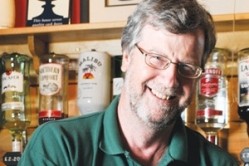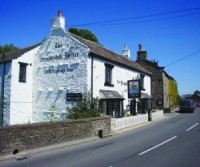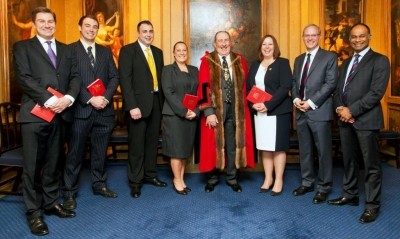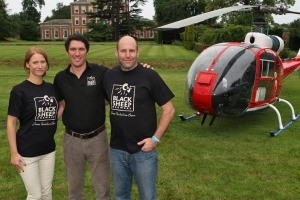The Big Interview: Paul Theakston

And now, sparkling in his hand at last, a glass of Black Sheep Best Bitter. He leaned to take that sweetest sip — and spat it out.
Nearly 20 years on, Theakston still grimaces at the thought of it. “The first brew was too bitter,” he says.
“We had to throw it all away. At first we had no idea what had gone wrong. Then we realised it needed a few days’ maturation to reduce the bitterness and round the flavour.”
That early setback did not prevent Black Sheep’s success. Indeed, the brewing style that made it so bitter matured into the distinct characteristics that established the beer into pubs across the country and took it to the head of a new wave of national ale brands.
Black Sheep is now brewing 70,000 barrels a year and Best Bitter continues to outperform the market. Last year Theakston had enough confidence in his sons, managing director Rob and commercial director Jo, to step back from the day-to-day running and, as chairman, take responsibility for exports. It’s the latest chapter in an inspiring story.
As a teenager, Theakston had “no burning desire to go into the brewery”, then “a classic of its type, there to support members of the family. I had one or two conversations with anxious parents about what I was going to do and in the end joining the brewery seemed natural”.
He worked for a year under the brewery engineer, then did a brewing pupillage at Mansfield Brewery. By the time his father died, and he returned to Masham as brewer, he was “into it”.
Uncle Thomas was in charge. “He looked after the books and the pubs and worried about things like the price of a pint breaking the two-shilling barrier. He thought nobody would buy beer again. He couldn’t see a future and wanted to sell up.
“I wanted to see it continue. It was my job and it was in my heart. There were the beginnings of an interest in cask beer, and for me it was important to keep it going as a local business. Roots are a strong driver for me. It was why we started Black Sheep in Masham when it might have been easier to do it somewhere else.”
Theakston persuaded two great uncles, significant shareholders, not to sell. Thomas retired and Paul became managing director at 23.
He focused the business on the Theakston beer brands and in 1974 seized an unexpected opportunity to expand, buying Carlisle Brewery, which was being sold off by the state after being nationalised in the First World War.
“We paid £116,000 for it and in two or three years the extra capacity enabled us to push out our boundaries and get into the take-home trade. We ended up with a national distribution and were brewing 70,000 barrels a year — the same as Black Sheep now.
“Financially, though, it was quite tough. We sold most of the tied houses to fund the brewing, and shareholders were brought in from outside the family.”
Theakston was in danger of losing control until Blackburn brewer Matthew Brown stepped in as white knight to buy a majority shareholding. But it wasn’t long before Matthew Brown was itself bought by Scottish & Newcastle (S&N), which told Theakston it wanted him out of Masham. He quit.
A likely premises for a new brewery in town came up at the former Lightfoot Brewery maltings, but there was a hitch. The only entrance was through the yard of the White Bear Hotel. And that was then owned by S&N. Before he eventually secured adjacent land for a new entrance Theakston says he saw inside only once, when he sneaked in through the pub’s yard one morning before dawn.
“I knew we’d get there, but it was frustrating, and what we were doing had to be kept secret.”
It wasn’t until March 1991 that he could work in the open. He bought fermenting vessels from Hardys & Hansons of Nottingham, and brewing kit from Hartley’s of Cumbria, which Frederic Robinson was closing.
Funding came from the Government’s Business Expansion Scheme, from which Theakston took the maximum £750,000 available in each of the first two years.
The name came from his wife Sue, over breakfast one day. The sheep part came from, well, what you can see out of the window when you’re in Masham. The black bit was a “tongue-in-cheek” addition. “But I don’t feel I’ve done anything maverick, and certainly I’ve done nothing wrong. I don’t regret anything. But have we ploughed our own furrow? Yes, that’s true,” Paul adds.
In September 1992 Black Sheep Best and Special, later known as Black Sheep Ale, hit a market already eagerly anticipating the new brew. Around 60 local pubs had agreed to give it a try, and Marks & Spencer ordered the first run of Special for its own-label Yorkshire bitter.
“We planned to be in supermarkets from day one,” says Theakston. “I was determined to have three or four legs of trade — supermarkets, the local on-trade, wholesalers and sales to the pub companies. A lot of growth in the early days came from the pubcos.
“We talked about buying pubs, and could have raised the money. But it would have diverted management attention away from our core mission — to grow a beer brand.
“So all our beer is sold on the open market and we’re subject to the vagaries of that.”
In recent years Black Sheep has had to defend its volumes amid the dozens of microbrewers that have sprung up in the soil fertilised by progressive beer duty (PBD).
Theakston regards them as fair competition, and believes Black Sheep’s quality will win out. “But there’s no reason why a brewery our size shouldn’t share in PBD to ease some of the pressure on us,” he adds. “It should stretch through on a graduated scale.
“As it is, our margins are squeezed, Revenue & Customs takes its chunk and we ruthlessly prune costs to end up at a profitability standstill. We’re like the proverbial swan, thrashing away underwater. It’s immensely frustrating. We could be going forward, creating jobs, rather than standing still.
“What stirs me up is the Government wants growth and it’s taking away from us with the other hand. It tells us to go forth and export, but that requires upfront time and investment.
“I think up all sorts of wild schemes. How about duty relief to the value of the beer we export? That would be worth having.”
Theakston describes beer exports as “the little challenge I’ve been given by the boys”. He seems faintly amused by his new position in the family hierarchy.
“It’s a funny feeling,” he says. “But I’m adapting to it more easily than I thought I would. It was my dream that the brewing would become a generational thing again, that we could pick up where I’d left off with Theakston’s, and the succession is something we’ve worked on over several years.
“It wasn’t easy for me, but I had an overwhelming feeling that it was time for the next generation to take over. And I’m not going to interfere — although I’m willing to point out to the boys any pitfalls that might come up. After all, they’re paying my pension!”
My kind of pub
“I’m very traditional. I feel comfortable with stone flags, an open fire and beams. And the licensees should have a presence front-of-house, so you really feel it’s their place.
“With this in mind, the Wensleydale Heifer at West Witton, North Yorkshire, ticks all the boxes for me.”
Key dates
1964
Paul Theakston starts working in the engineering department of T&R Theakston
1965
Takes brewing pupillage at Mansfield Brewery
1968
Returns to Theakston’s as brewer
1969
Becomes managing director
1974
Buys Carlisle Brewery
1984
Theakston’s acquired by Matthew Brown
1987
Matthew Brown acquired by Scottish & Newcastle
1988
Paul Theakston removed as MD of Theakston’s
1992
Black Sheep Brewery launched
2006
New brewhouse increases capacity by 65%
2010
Rob Theakston becomes joint managing director alongside father
2011
Paul Theakston steps up to chairman, taking charge of exports


















